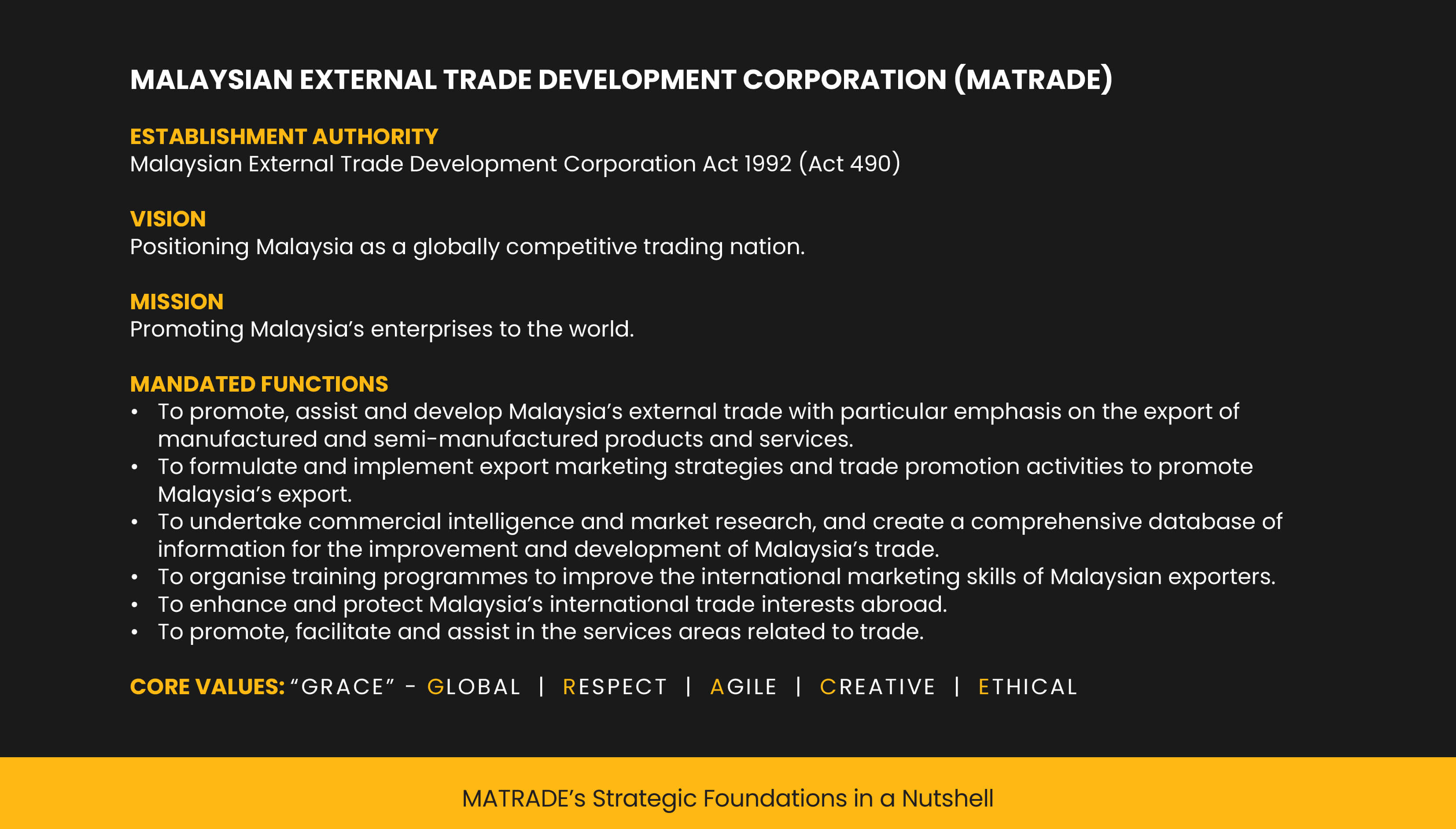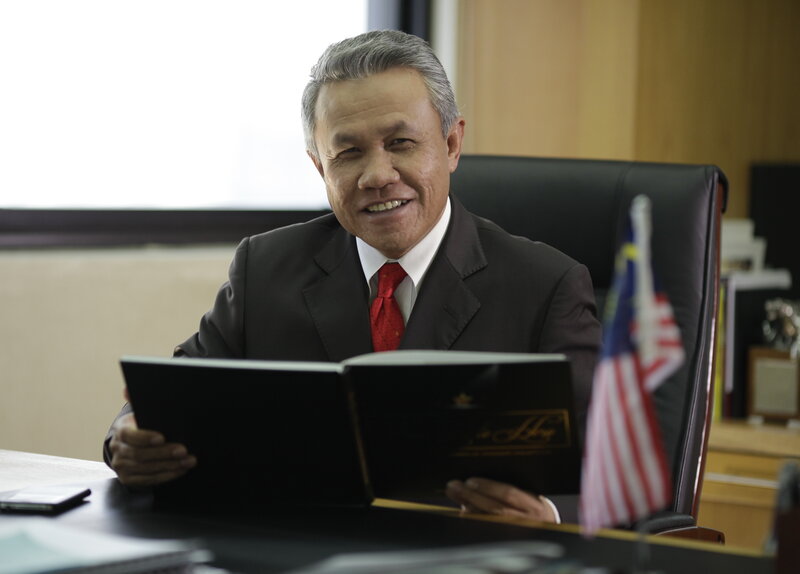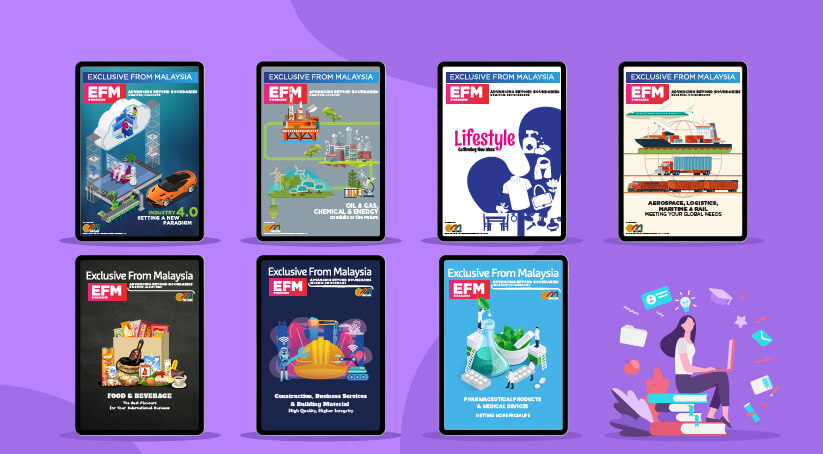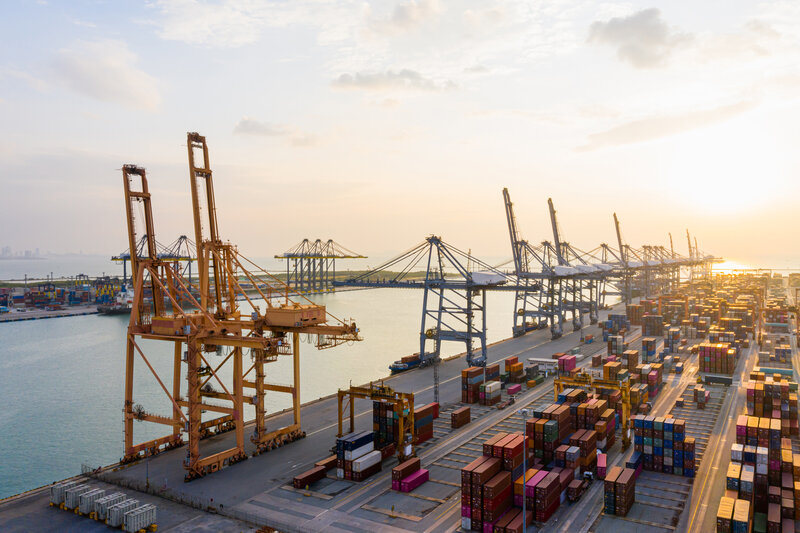Navigating Rough Waters: MATRADE Rises to the Challenge of a Trying Year
MATRADE’s numerous achievements in the past decade can be attributed to having a clear vision, thoughtful foresight, a robust team and strong leadership.

MATRADE continues to encourage Malaysian companies to go abroad and elevates homegrown products and services to the global market.
History will remember 2020 as a year, unlike any other. Reports of disease outbreak early in Q1 quickly morphed into unprecedented concern over a worldwide pandemic and, by March 2020, the SARS-Cov-2 virus had changed lifestyles, public health and economic status in 188 countries worldwide.
Now, almost a year into the crisis, populations are still reeling. The worldwide death toll exceeds 1.6 million. Social distancing, personal protective equipment, educational disruption, movement restrictions – all are unexpected realities that no one wanted. The new normal.
Crushing financial and business impacts have overthrown world economic equilibria. Almost from the outset, the World Trade Organisation (WTO) warned that, with massive scaling back of production and consumption, COVID-19 represented a historic level of disruption to the global economy and world trade. By June, the World Bank was projecting that in 2020, advanced economies could shrink as much as 7%, with subsequent spill-over effects for developing economies expected to contract by 2.5% or more. The weakest showing in sixty years was predicted. Later Organisation for Economic Co-operation and Development (OECD) estimates moderated a few of these dire predictions. Although the global economy impacts may not be as bad as initially anticipated, times will still be tough.
Unemployment rates soared in most countries. Demand for oil and the retail footfall all but dried up as lockdowns around the world restricted consumer movement and spending patterns. The International Labour Organisation’s (ILO) findings show SMEs just about everywhere experienced lower revenues, reduced demand for orders, cash flow shortages and real threats to business continuity.
The United Nations Conference on Trade and Development (UNCTAD) went further, pointing out that the pandemic hit hardest at society’s most vulnerable and disadvantaged – low-income households, migrants, workers in the informal sectors and often women. Its November 2020 report, Impact of the COVID-19 Pandemic: Transitioning to a New Normal concluded that more resilient production networks and international trade must play a key role in achieving a stronger, more inclusive and greener economic recovery.
In Malaysia, this critical imperative has been shouldered largely by MATRADE. The Malaysia External Development Corporation is Malaysia’s national trade promotion agency, under the Ministry of International Trade and Industry (MITI). Established in March 1993, MATRADE exists to position Malaysia as a globally competitive trading nation. It assists Malaysian exporters to develop and expand their export markets through a range of activities, including trade publications, overseas marketing missions and trade fairs. It has five local branches and trade offices on six continents that function to identify new export opportunities and to connect Malaysian companies with foreign buyers.
There is widespread consensus that the Malaysian trade ecosystem has handled 2020’s economic roller coaster rather well. Early “bad news figures” in national trade statistics began showing some recovery as early as June. And by July, Malaysia’s exports increased by 3.1% to RM92.56 billion compared to July 2019, the highest export value ever recorded for that month. Two months later, exports again reached the highest month-on-month value ever recorded, this time for September. For the first 10 months of 2020, the trade surplus recorded double-digit growth of 16.3% to RM147.04 billion compared to the same period in 2019. Total trade was valued at RM1.454 trillion, a decline of 4.9%.
Not bad for a period of unparalleled workforce disruption, supply chain uncertainty, transport and cross-border restriction and shaky consumer confidence in global markets. Many factors enter into this performance but, certainly, much of the credit has to go to MATRADE. It makes one wonder, “what worked?”

Our Fourth Leap deep-dive identifies three primary factors. First, leadership style and decision making have been sound and agile, making tactical adjustments when necessary but holding fast to the agency’s strategic vision and core values. Second, MATRADE’s early headstart in digital transformation provided concrete organisational and technical capabilities to enable a recovery-oriented mindset. And, finally, steady progress enhancing the world’s perception of Malaysian goods and services kept product demand and marketability high, even in the face of volatile pandemic uncertainty.

Wan Latiff champions IR4.0 to weather the pandemic and encourage IR4.0 technology adoption among Malaysian companies to maintain competitiveness.
MATRADE’s IR4.0 Leadership Pinnacle
It has been said that the only safe ship in a storm is leadership. Since January 2019, MATRADE top leadership has been synonymous with its dynamic Chief Executive Officer, YBhg Dato’ Wan Latiff Wan Musa. A long-term public servant, he began his 36-year Government career in 1984, when he joined Tourism Malaysia following his completion of an intensive two year Tourism Education programme at Japan’s prestigious Rikkyo University. During his tenure with Tourism Malaysia, he served as Director of its Tokyo office and was instrumental in promoting hospitality and tourism links with both public and private sector interests.
Earlier he had obtained a bachelor’s degree in Economics from the National University of Malaysia and an MBA from the Mara University of Technology. He also graduated from the fifth ASEAN Senior Management Development Program (5SMDP) at Harvard University Business School.
Wan Latiff joined MATRADE in 1994 and served as Trade Commissioner for nine years, heading the agency’s trade offices in Cologne, Toronto and New York. He subsequently held senior positions in MATRADE headquarters, including export promotion, finance, procurement, strategic planning and management services. He was the Deputy CEO and became MATRADE’s eighth Chief Executive since February 2019.
The breadth of Wan Latiff’s professional background and public service expertise is quickly apparent when one examines the array of success MATRADE has achieved under his helmsmanship. The agency is mandated to carry out two primary functions. Export promotion involves the creation of opportunities for Malaysian firms to market goods or services internationally through building connections between local producers and overseas buyers. It organises a wide range of promotional activities, including trade fairs and missions to promising global destinations. Trade matching, international sourcing programmes and B2B roundtable sessions provide lead generation and market intelligence for product promotion and strategic planning.

The second mandate involves initiatives aimed at raising the competitiveness of Malaysian exporters. Training programmes, networking assistance and informational support to build contacts and skillsets help prepare local companies to export products and services abroad.
Under Wan Latiff’s guidance, MATRADE initiatives made new inroads into export markets for a range of Malaysian services and manufactured goods throughout 2019. Halal products were a priority during an Export Acceleration Mission to Davao City, Philippines along with agribusiness, tourism-related facilities and real estate. MATRADE successfully promoted business connections with Bangladeshi chemical industry players and 49 Malaysian companies. It connected 93 Malaysian manufacturers of wood-based products with 64 buyers from 14 countries (including China, India, Mauritius, Sri Lanka, USA, Mexico, France and Poland) through its signature business matching International Sourcing Programme (INSP).
A major success story, a firm called Dr Aishah Solution Sdn Bhd (DAS), was groomed to enter the Japanese halal snack and confectionery market through active participation in MATRADE’s Women Exporters Development Programme (WEDP) and other export readiness and promotion initiatives. Emphasising product quality as its core selling proposition, DAS Granola and Asian Superfood items were positioned for consumer sales in supermarkets and at the Olympiad in Tokyo.
A January 2019 feature article in Fourth Leap (Issue No. 1) highlighted MATRADE successes, trumpeting that – with the advent of the Fourth Industrial Revolution – the Agency was poised to achieve real potentials in transforming the Malaysian manufacturing industry. Things were going great. The future looked bright.
Fast-forward to February 2020. Along came COVID-19, and everything changed.

Chief Executive Officer Dato’ Wan Latiff has led the Malaysia External Trade Development Corporation (MATRADE) to make new inroads into export markets for a range of Malaysian services and manufactured goods.
MATRADE Confronts the Coronavirus – Rapid Response, Digital Solutions
In the space of a couple of months, COVID-19 brought the world to its knees, impacting global trade and economic wellbeing in a manner that had not been seen before. Wan Latiff and MATRADE had to brace for the challenges of carrying out the mandate the rakyat had entrusted to the agency. It was not easy.
Industry confidence took an almost immediate hit. MATRADE conducted a survey over a four-day period in April 2020, with a sample of just over 1,200 business skewed toward SMEs. They found that a walloping 85% of respondents reported losing contracts or orders since the imposition of the Movement Control Order. 83.5% said they had lost RM5 million in revenue since the outbreak and 14.3% had lost up to RM50 million. Among SMEs, 91% expected exports to decline even further during 2020.
With movement control protocols and social distancing mandates, trade show events that had been the bread-and-butter of MATRADE’s export promotion activities were no longer viable. In rapid succession, one after another was cancelled or rescheduled. The 17th edition of Malaysia International Halal Showcase (MIHAS) 2020 which was scheduled in April 2020 was postponed to September 2020 and then again to September 2021. The Kuala Lumpur International Aerospace Business Convention (KLIABC) in June, also had to be delayed.
The situation called for an out-of-the-box solution, as MATRADE shifted to a digital format for previously scheduled trade fairs and product expositions. It found the solution it needed online.
On September 1st, MATRADE held the first-ever comprehensive virtual exhibition in the country, #MyAPEC2020 Exhibition, organised in conjunction with Malaysia as the host for the Asia Pacific Economic Cooperation (APEC) 2020. In addition to the virtual display of exhibits, it even featured an immersive business platform that included business pitching, virtual B2B meetings and webinar. More than 8,500 visitors attended online, joining the event from over 90 economies, including the USA, Japan, India and Australia.
In his message to participants, Wan Latiff commented, “In view of the travel restrictions around the world, where face-to-face meetings are limited, MATRADE would like to encourage more Malaysian companies to leverage on the B2B meeting platform at the #MyAPEC2020 Exhibition. Through this initiative, Malaysian exporters will be connected to international buyers that are interested to source products and services from Malaysia, as arranged by our 46 MATRADE overseas offices located all over the world.”
Before the pandemic, MATRADE would match buyers from all over the world with Malaysian exporters via its signature B2B meetings programme called International Sourcing Programme (INSP). Due to the international movement ban, MATRADE converted the B2B into a virtual format, which MATRADE named eBizMatch. As of 30th November 2020, a total of 940 eBizMatch have been arranged, generating RM1.08 billion of export sales.
Similarly, Malaysia’s National Export Day had always been a core trade event arranged by MATRADE for exporters and others, but in 2020 the format shifted to a virtual format. The eNational Export Day (eNED2020) was a 3-day online affair bringing together a 1,300-member audience from every corner of the country and from around the world. “The high turnout shows a strong interest among our companies to continue their export business despite border closure,” stated Wan Latiff. “It is crucial for MATRADE to encourage these companies to continue venturing abroad and this event will help them understand how they can do things differently in the new norm.”
The previously postponed KLIABC2020 also went digital in November, as a 100% online event complete with live-streaming sessions, interactive panel discussions and seamless expert-led content on-demand. The intent was to provide a total nexus for world players who were sourcing regional expertise in aerospace parts and components manufacture, engineering and design services, system integration or maintenance, repair and overhaul.
MATRADE offered more than just encouragement. To help companies reduce the financial burden of market promotion, MATRADE provided RM22.25 million in Market Development Grants (MDGs) to a total of 1,320 applicant firms during the first 11 months of 2020. Further, in recognition of the financial difficulties faced by sudden cancellation or postponement of trade promotion events, partial compensatory support was provided through the MDG programme for non-refundable participation fees, airfares and accommodations.
Digitally Transforming Service Delivery in 2020
Digitalisation also formed the backbone for a number of other agency services. MyExport is an online application for Malaysian exporters registered with MATRADE. It provides access to key trade information and market intelligence compiled at overseas offices.
From January to November 2020, MATRADE distributed 675 Market Alert reports and 132 Product Market Study reports, with information on regional economic and market developments, export opportunities, standards and foreign trade policies and regulations. MyExport also deployed 2,660 trade leads, based on inquiries received from foreign firms keen to acquire goods and services from Malaysia. Attractive products include pharmaceuticals, food and beverage, chemicals, automotive, furniture and electrical/electronics.
Proudly, MyExport received 2nd runner-up recognition for Best Use of Information Technology, at the 2020 World Trade Promotion Awards in Geneva. “By participating in this award, MATRADE is able to showcase how a digital platform can help Malaysian exporters endure COVID-19 challenges and continue to stay connected with their business partners around the world,” said Wan Latiff. “We were delighted to be among this select group of the world’s innovative trade promotion organisations.”

Exclusive From Malaysia, a series of digital publications by MATRADE, showcase Malaysian products and services that are innovative and in high demand in both local and international markets.
A well-received e-magazine, Exclusive from Malaysia, is published online to showcase world-class Malaysian products that are innovative, unique or in high demand in overseas markets. Glossy, informative and free of charge, previous issues have profiled key exports in engineering consultancy and supplies, food and beverage domains, home and lifestyle products, medical devices, health care supplements, pharmaceuticals and many others. Wan Latiff described the publication as “a testament to Malaysia’s dedication towards forging relationships with clients, providing information on top-notch products and services, thus enabling them to secure better positioning in the marketplace.”
International business relationships and networking were also forged digitally, through the agency’s eBizMatch platform as highlighted earlier. The Government, through MATRADE as the lead implementing agency, introduced the eTRADE programme to assist Malaysian SMEs leverage the power of e-Commerce. The programme helps exporters promote their wares to global markets through listings on 20 selected international e-commerce platforms. Since its inception, the programme has benefitted over 4,000 Malaysian SMEs who have made inroads into markets such as Cambodia, Thailand, China, USA and Egypt, among others.
With face-to-face training, workshops, retreats and other more traditional exporter empowerment activities precluded due to social distancing requirements and travel restrictions, MATRADE turned again to digital solutions and remote learning strategies. Throughout 2020, a total of 134 webinars were organised in collaboration with partners including the Asian Development Bank (ADB), Islamic Centre for Development of Trade (ICDT), The Star, eBay and McKinsey & Co. Among topics covered were market updates, trade promotion strategy, supply chains and the impact of COVID-19 on business continuity.

IR4.0 will help businesses readily access new markets, thus providing more opportunities for growth.
Accelerating Industry 4.0
MATRADE’s rapid transition to a digital model for so many critical programmes and services could not have taken place had the trail forward not been blazed some time ago. Since assuming leadership within the organisation, Wan Latiff has been a champion for the oncoming Fourth Industrial Revolution. Survival during the pandemic simply created the necessity for a more urgent transformation.
In a 2019 interview with The Business Year, he saw the Fourth Industrial Revolution as a major shift toward propelling productivity and enhancing competitiveness. “The growth of Industry 4.0 will provide greater avenues for Malaysian companies to short circuit the growth cycle as it enables businesses to grow quickly and access new markets.”
“The economic impact of Industry 4.0 could be noticeably significant for Malaysia’s manufacturing industry, especially sectors involved in the development and marketing of products.”
These views turned out to be far-sighted, foretelling the shifts that would have to be implemented in rapid response to the unexpected conditions created by the pandemic. The fact that Wan Latiff had been gently guiding MATRADE and the export industry down the road to digital transformation beforehand only meant a greater level of preparedness when the crisis occurred.
In fairness, this foresight was not exclusive to MATRADE. Across Malaysia, Governments at all levels had embraced new developments in the digital world. Digital transformation was a central feature of the 11th Malaysia Plan, and a National Strategy for e-Government emerged in several strategic planning instruments beginning as early as 2016. Public service training through the highly successful Digital Government Competency & Capability Readiness (DGCCR) programme and steady progress in the development of one-stop, no-wrong-window Government as a Platform model have laid the groundwork for an accelerated leap forward into IR4.0. Recent positioning of Malaysia as the “Heart of Digital ASEAN” infers even faster implementation of new era solutions born of an increasingly agile mindset.

Malaysia supplies to more than 200 countries and is consistently rated as the top 25 trading nations of the world.
Malaysian Exports on an Upward Trajectory
The other factor underlying Malaysia’s positive export performance in weathering the stormy conditions of 2020 is, of course, the enhanced reputation that Malaysian goods and services have steadily acquired in the global marketplace.
Within the global supply chain, Malaysian companies have become recognised as leading sourcing partners, especially for semiconductors, medical disposables and devices, processed food, building material, health care, education, customer experience outsourcing, ICT and engineering services. Superior quality and reliability in conforming to world-class standards have raised levels of confidence and trust among purchasers worldwide.
Malaysia now supplies to more than 200 countries. It is consistently rated as the top 25 trading nations of the world.
Indeed, the pandemic may have, in a strange sense, provided new opportunities for showing off the benefits realisable through Malaysian exports. Early in November, Wan Latiff created some waves when he said, “During this time, it’s not for us to sit down and do nothing. We need to enhance our efforts and we need to remind our customers that Malaysia is here and ready to do business.”
This message has been enhanced by the exemplary way the Malaysian export sector conducted itself during the crisis. Examples of excellent corporate citizenship and innovative product development abound. Malaysian firms stepped up production of testing technology, medical devices and PPE and ensured prompt reliable distribution to parts of the world where they were most needed.
In a July news release, the Oxford Business Group noted that, while global trade had shrunk considerably following the outbreak of COVID-19, Malaysia had seen an unexpected rise in both its exports and its trade surplus. Analysts at the Overseas Bank Malaysia attributed this performance to the diversification and prioritisation of exports, the easing of supply-chain disruption, clearing backlog orders and a release of pent-up demand. All these combined to enhance the attractiveness of Malaysia’s exports on offer.
“It’s up to us to keep that momentum going, to build a strong foundation now so that our companies can grab onto opportunities immediately, rather than start preparations later on.”
An Enduring Legacy
MATRADE has recently announced that YBhg Dato’ Wan Latiff Wan Musa will retire from his post as Chief Executive Officer on December 24th, 2020. He leaves the agency with a sound succession plan and a clear vision for continued success as it continues to march forward into the Fourth Industrial Revolution. With his vast experience and knowledge in international trade, he is willing to assist Malaysian exporters in developing and expanding their export markets.
It has been said that outstanding leaders leave their imprint on the people they manage, the systems they establish and the organisational culture they nurture. From all accounts, this is true of the legacy that will remain after Wan Latiff’s departure. His calmness, patience and attention to detail are traits that have now become part of the tapestry which defines MATRADE. An energetic, hard-working leader who became famous within the organisation for doing his own research, analysis and write-up, his high energy commitment to export promotion and exporter readiness development has set the bar for performance excellence that will remain long after he closes his office door for the final time. His emphasis on organisational growth and constant upskilling, not only for his own agency personnel but throughout the export community in general, will continue to reverberate.
In many ways, Wan Latiff’s embrace of a future vision for digital government and social change linked to the Fourth Industrial Revolution will form a key component of his legacy, too. Under his tutelage, MATRADE was already well on its digital transformation journey before COVID-19 shattered the surrounding macro-environment. This, perhaps more than any other factor, was what permitted the rapid implementation of new and agile methods for getting the job done.
He said, “It’s up to us to keep that momentum going, to build a strong foundation now so that our companies can grab onto opportunities immediately, rather than start preparations later on.” Wise counsel indeed.
Written by: Dr Alan Downe, Fourth Leap Senior Contributor







